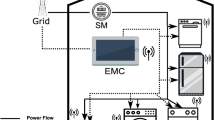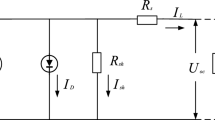Abstract
This paper proposes a hybrid optimization to solve the scheduling of household power consumption for Step and Time-of-Use (TOU) tariff system. The target function is the cost of electricity, and the optimization object is total instantaneous power within a billing period. The control variables are starting moments of each household appliance. The optimization procedure is divided into two stages. Firstly, the prerequisite for minimal cost is calculated through mathematical analysis and generalized function theory. Secondly, the solution is obtained by using a heuristic algorithm in which the result of the first stage is considered to reduce the searching space. And an evaluation methodology is deduced to evaluate the optimization. The computer simulation demonstrates that the proposed approach can reduce the cost of electricity evidently in the sense of probability. The approach shows great value for embedded applications.
Similar content being viewed by others
References
Yu Yixin, Luan Wenpeng. Smart grid[J]. Power System and Clean Energy, 2009, 25(1): 7–11 (in Chinese).
Farhangi H. The path of the smart grid[J]. Power and Energy Magazine, IEEE, 2010, 8(1): 18–28.
Hart D G. Using AMI to realize the smart grid[C]. In: Power and Energy Society General Meeting—Conversion and Delivery of Electrical Energy in the 21st Century. Pittsburgh, 2008. 1–2.
Potter C W, Archambault A, Westrick K. Building a smarter smart grid through better renewable energy information[ C]. In: Power Systems Conference and Exposition. Seattle, 2009. 1–5.
Roncero J R. Integration is key to smart grid management[C]. In: CIRED Seminar. Frankfurt, 2008. 1–4.
Sheble G B. Smart grid millionaire[J]. Power and Energy Magazine, IEEE, 2008, 6(1): 22–28.
Fan Z, Kalogridis G, Efthymiou C et al. The new frontier of communications research: Smart grid and smart metering[C]. In: Procedings of the 1st International Conference on Energy-Efficient Computing and Networking. New York, 2010. 115–118.
Wolsey L A, Nemhauser G L. Integer and Combinatorial Optimization[M]. Wiley, New York, 1988.
Luus R. Optimization of system reliability by a new nonlinear integer programming procedure[J]. IEEE Transactions on Reliability, 1975, 24(1): 14–16.
Ingolfsson A, Campello F, Wu X D et al. Combining integer programming and the randomization method to schedule employees[J]. European Journal of Operational Research, 2010, 202(1): 153–163.
Tillman F A. Optimization by integer programming of constrained reliability problems with several modes of failure[ J]. IEEE Transactions on Reliability, 2009, 18(2): 47–53.
Nash S G, Sofer A. Linear and Nonlinear Programming[ M]. McGraw-Hill, New York, 1995.
Sistu P B, Bequette B W. Process identification using nonlinear programming techniques[C]. In: American Control Conference. San Diego, 1990. 1534–1539.
Moreton H P, Séquin C H. Functional optimization for fair surface design[C]. In: Proceedings of the 19th Annual Conference on Computer Graphics and Interactive Techniques. New York, 1992. 167–176.
Giulini S, Sanguineti M. Approximation schemes for functional optimization problems[J]. Journal of Optimization Theory and Applications, 2008, 140(1): 33–54.
Atkinson K, Han W M. Theoretical Numerical Analysis: A Functional Analysis Framework[M]. Springer Verlag, New York, 2010.
Bandle C, Wagner A. Optimization problems for an energy functional with mass constraint revisited[J]. Journal of Mathematical Analysis and Applications, 2008, 352(1): 400–417.
Guan Xiaohong, Zhai Qiaozhu, Feng Yonghan et al. Optimization based scheduling for a class of production systems with integral constraints[J]. Sci China Ser E-Tech Sci, 2010, 40(1): 41–51 (in Chinese).
Konjik S, Kunzinger M, Oberguggenberger M. Foundations of the calculus of variations in generalized function algebras[J]. Acta Applicandae Mathematicae, 2008, 103(2): 169–199.
Oberguggenberger M, Pilipović S, Scarpalézos D. Positivity and positive definiteness in generalized function algebras[ J]. Journal of Mathematical Analysis and Applications, 2007, 328(2): 1321–1335.
Author information
Authors and Affiliations
Corresponding author
Additional information
GUO Jingtao, born in 1979, male, doctorate student.
Rights and permissions
About this article
Cite this article
Guo, J., Jin, Z. & Liu, H. Scheduling of household power consumption for Step and Time-of-Use tariff system. Trans. Tianjin Univ. 17, 369–375 (2011). https://doi.org/10.1007/s12209-011-1613-5
Accepted:
Published:
Issue Date:
DOI: https://doi.org/10.1007/s12209-011-1613-5




